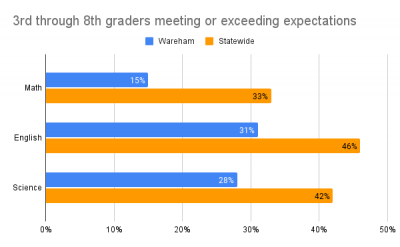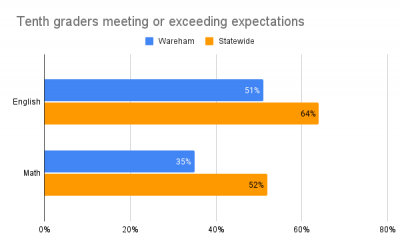MCAS scores reflect ‘disrupted school year’ during pandemic
The state released the results of the Spring 2021 MCAS tests on Sept. 21, and the impact the pandemic has had on students’ education can be seen in the scores to some degree — both within Wareham Public Schools and across the state.
MCAS is a statewide system of standardized testing. Students in grades three through eight take English and math exams. Fifth and eighth graders also take a science exam.
Students take their final English and math MCAS exams in tenth grade.
MCAS tests were not administered in spring 2020 because of the pandemic, so students’ 2019 scores are the most recent scores available for comparison.
Overall, a smaller percentage of Wareham students in all grade levels met or exceeded expectations than students statewide.
Dr. Andrea Schwamb, the assistant superintendent for Wareham Schools, attributed the results, at least in part, to the strangeness of the conditions under which the tests were administered.
“A lot of our kids were home taking the test. Some were in school taking the test,” she said. “There were a million changes in schedule throughout the year.”
She emphasized that the MCAS exams are meant to be used as a diagnostic tool to tell schools where students need support. In addition, she explained that the district also conducts its own testing three times a year to assess student learning. Students already took the first of the three exams this year, and the results tell a slightly different story, Schwamb said.
“Those assessments are showing that our kids didn’t lose as much as what the MCAS says,” she said. “And part of that, I would say, is because they’re in school, in their groups, with their teachers.”
Secretary of Education James Peyser wrote that statewide, “the results clearly illustrate how the disrupted school year of remote and hybrid learning impacted students’ academic achievement.”
According to a press release from the state, “Results show that many more students had gaps in their knowledge of math and, to a lesser extent, English language arts, compared to students in the same grades before the COVID-19 pandemic, and fewer students [met] or exceeded grade level expectations.”
In June, citing the “disruption caused by the pandemic,” the state Board of Elementary and Secondary Education voted not to issue new “accountability designations” for school districts this year. Accountability designations typically take into account MCAS scores and growth along with other factors such as graduation rates and attendance.
Districts will keep the designations they had before the pandemic, and the state will begin making new accountability designations in 2022.
Elementary and Middle School results
Just 15 percent of Wareham students in grades three through eight are meeting or exceeding expectations in math, as compared to 33 percent of students statewide. Fifty-one percent of Wareham students partially met expectations, as compared to 45 percent statewide, and 34 percent did not meet expectations, as compared to 22 percent statewide.
In 2019, 27 percent of Wareham’s third through eighth graders met or exceeded expectations in math, as compared to 49 percent of students statewide.
“The concern is math,” Schwamb said. “And that’s a concern across the state. [...] And so we are hyper-focusing in on providing opportunities for students in math to gather the skills and strategies that they need — that they may have missed as a result of the pandemic.”
She said students would “gain the momentum back” now that they’re back in the classroom.
In English language arts, 31 percent of Wareham students in grades three through eight met or exceeded expectations, as compared to 46 percent of students statewide. Forty-eight percent of Wareham students partially met expectations, as compared to 38 percent statewide, while 21 percent of Wareham students did not meet expectations, as compared to 16 percent statewide.
In 2019, 38 percent of Wareham’s third through eighth graders met or exceeded expectations in English, as compared to 52 percent of students statewide.
Schwamb said that, overall, the English language arts scores indicate the district “pretty much maintained” the scores seen in previous years, despite the “tumultuous situation” presented by the pandemic.
In science, 28 percent of Wareham’s fifth and eighth graders met or exceeded expectations, as compared to 42 percent statewide. Fifty-one percent of Wareham students partially met expectations — ten percent more than students statewide — and 22 percent of Wareham students did not meet expectations, as compared to 17 percent statewide.
In 2019, 32 percent of Wareham fifth and eighth graders met or exceeded expectations in science, as compared to 48 percent of students statewide.
Tenth grade results
The 2021 cohort of tenth graders outperformed those in 2019 in both English and math.
Tenth grade students stood a cut above the rest, with 51 percent meeting or exceeding expectations in English, as compared to 64 percent statewide. Thirty-nine percent partially met expectations, as compared to 27 percent statewide, and 10 percent did not meet expectations, as compared to nine percent statewide.
In 2019, 34 percent of Wareham tenth graders met or exceeded expectations in English — 17 percent fewer than in 2021. Sixty-one percent of tenth graders met that mark statewide in 2019.
“I was pleasantly surprised by the tenth grade scores,” Schwamb said. “They’re older, more mature — they can navigate being home [or online]. They’re more used to all of those challenges than our younger kids. So I’m grateful they did well.”
In math, 35 percent of Wareham tenth graders met or exceeded expectations, as compared to 52 percent statewide. Fifty-one percent of Wareham students partially met expectations, while 14 percent did not meet expectations — compared to 36 and 12 percent of students statewide, respectively.
In 2019, 30 percent of Wareham’s tenth graders met or exceeded expectations, compared to 59 percent of tenth graders statewide.
Individual scores
According to the statement from the state’s Education Department, MCAS scores for individual children will be released after Sept. 30.
“Families of students who were in grades 3-8 in the spring should keep in mind that those students were given shorter than usual tests, which can cause individual student performance to vary more than usual as compared to previous years,” the statement said. “Families should also remember that MCAS results are only one measure of their child's growth and achievement.”















